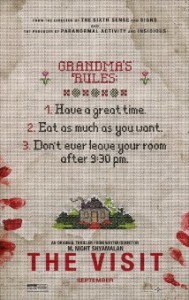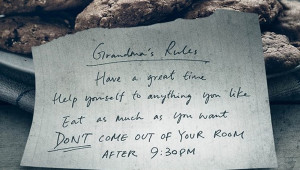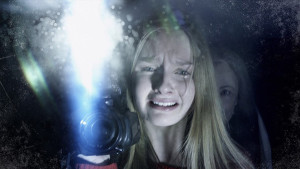 Night Shyamalan returned to the big screen and the horror genre this past weekend with The Visit. Of course, the real question that everybody has been asking is, “what kind of return is it— a Sixth Sense effort or an Airbender abomination?” As it turns out, the answer is, much like the director’s cacophonous filmography, troublesome.
Night Shyamalan returned to the big screen and the horror genre this past weekend with The Visit. Of course, the real question that everybody has been asking is, “what kind of return is it— a Sixth Sense effort or an Airbender abomination?” As it turns out, the answer is, much like the director’s cacophonous filmography, troublesome.
The Visit, Shyamalan’s first foray into found-footage territory, takes us on a visit to grandma’s house with two siblings, Becca (Olivia DeJonge) and Tyler (Ed Oxenbould). The former is—surprise, surprise—an aspiring filmmaker, a convenient contrivance that allows for the all-seeing camera eye, while the latter specializes in annoying his sister with misogynistic rapping. It sounds like a wonderful, fun-filled weekend, right? It would be, but grandma (Deanna Dunagan) and grandpa (Peter McRobbie) are a little creepy; he cleans his gun by sticking the barrel in his mouth, and she has a penchant for running around the house naked at night. But never fear: like all filmic teenagers, Becca and Tyler are very patient with their grandparents’ oddities, so they stick stick around long enough for things to get really crazy.
 Unfortunately for The Visit, conventionality and predictability are not the film’s biggest enemies. The most significant issue with the film is that it is Shyamalan’s most tonally confused film to date. M. Night tries to combine comedy, horror, and Hallmark-style sermonizing in one film and fails miserably in that respect. Simply put, The Visit does not know what kind of film it wants to be. One minute audiences are laughing out loud, and in the next they are assaulted with a barrage of disturbing scenarios. In many cases, the comedy renders the horror ineffective—or puzzling at the least.
Unfortunately for The Visit, conventionality and predictability are not the film’s biggest enemies. The most significant issue with the film is that it is Shyamalan’s most tonally confused film to date. M. Night tries to combine comedy, horror, and Hallmark-style sermonizing in one film and fails miserably in that respect. Simply put, The Visit does not know what kind of film it wants to be. One minute audiences are laughing out loud, and in the next they are assaulted with a barrage of disturbing scenarios. In many cases, the comedy renders the horror ineffective—or puzzling at the least.
Additionally, The Visit unsuccessfully attempts to overcome its formulaic premise by dabbling in meta territory. Shyamalan incessantly uses Becca’s fondness for cinema to remind us that that we are watching a film within a film; but somehow, moments of characters pointing out framing techniques or mise-en-scène come off as either desperate or pretentious instead of smart.
Equally disappointing is the film’s lack of narrative build. The so-called twist is lackluster and predictable, and before long it feels like we’re seeing the same scene on repeat. The kids hear something in the house at night or see something strange during the day; they go to investigate; they see something crazy and disturbing; they talk about how crazy/disturbing it is. Rinse. Repeat.
 Shyamalan also tries to explore some interesting thematic territory in The Visit, and this is perhaps where the film is most perplexing. Several scenes set up intriguing narrative threads that are inexplicably abandoned. These dangling plot threads are made even more apparent in the film’s train wreck of a final scene, which features an out-of-nowhere treatise on forgiveness and love, a Shyamalan version of the Jesus Juke.
Shyamalan also tries to explore some interesting thematic territory in The Visit, and this is perhaps where the film is most perplexing. Several scenes set up intriguing narrative threads that are inexplicably abandoned. These dangling plot threads are made even more apparent in the film’s train wreck of a final scene, which features an out-of-nowhere treatise on forgiveness and love, a Shyamalan version of the Jesus Juke.
In spite of its predictability, inscrutable tonal mishmash, uninspired narrative buildup, and prosaic—dare I say, cheesy—denouement, The Visit is not altogether without merit. The film’s comedic elements work (for the most part). Ed Oxenbould’s character is hilarious—and I mean uproariously funny at times, and Peter McRobbie and Deanna Dunagan will make you think twice about visiting your grandparents. The cast brings a lot of charm to The Visit; and for this reason, I think the film will find its intended audience. But those waiting for a return to Shyamalan’s Sixth Sense glory days will probably find themselves having to wait a little longer.
